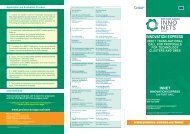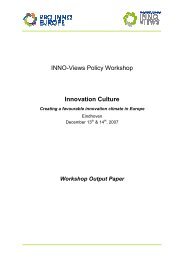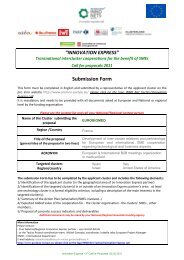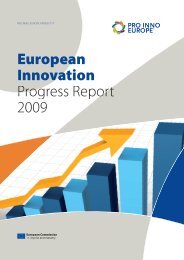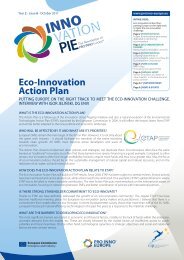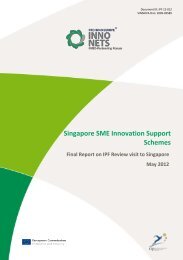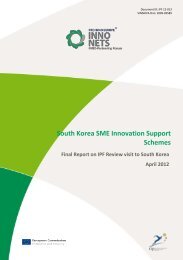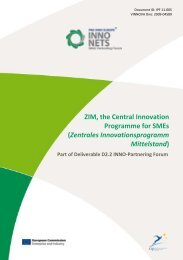Benchmarking National - PRO INNO Europe
Benchmarking National - PRO INNO Europe
Benchmarking National - PRO INNO Europe
You also want an ePaper? Increase the reach of your titles
YUMPU automatically turns print PDFs into web optimized ePapers that Google loves.
76<br />
BENCHMARKING NATIONAL AND REGIONAL SUPPORT SERVICES FOR SMES IN THE FIELD OF INTELLECTUAL AND INDUSTRIAL <strong>PRO</strong>PERTY<br />
IP Prédiagnosis (FRA)<br />
Provided by the <strong>National</strong> Industrial Property Institute (INPI–Institut national de<br />
la propriété industrielle; the French Patent Office), the overall aim of IP<br />
Prédiagnosis is to analyse SMEs as a whole with regard to their IP and IPR<br />
usage. The service is thus not focused on a particular project or invention. The<br />
target group consists of enterprises that have not registered a patent before<br />
(within the past five years) and usually do not possess an IPR strategy and/or<br />
relevant IP management. During an IP Prédiagnosis (which can last between<br />
1.5 to 2 days) the service provider (an IP rights expert) discusses the company’s<br />
situation with its manager in order to identify the enterprise’s needs, wants<br />
and expectations in the field of IPR. A standardised guidebook has been<br />
specifically designed and tested for this purpose. The expert analyses the state<br />
of the art of the IP management and/or strategy of the enterprise, evaluates<br />
the significance of IPR in the present situation and formulates issues that can<br />
probably influence the future ambitions of the company. Needs, priorities and<br />
expectations are identified and put into a report outlining the different options<br />
for the enterprise to protect and use its IP.<br />
� Services that raise awareness implicitly: Another way encountered to convey<br />
value and effective awareness in a thorough manner is through the use of<br />
instruments which one would normally not associate as a typical means of<br />
raising know-how on a particular subject. For example, subsidies towards<br />
patenting costs might be designed in such a way that the supported SMEs find<br />
themselves in a position where they will get advice/consulting on IPR within<br />
different stages of the patent filing process. The payment instalments of the<br />
German “INSTI SME Patent Action” subsidy are, e.g., linked to different<br />
milestones of the patenting process, and the service team accompanies the<br />
SME through all these different stages. The subsidy (i.e., the possibility to get<br />
monetary support for a costly process) thus acts as a vehicle (“hygiene factor”,<br />
as one might be tempted to call it) to create an entry point for SMEs in order<br />
to receive – probably much more important – “fringe benefits” in the form of<br />
IPR know-how (see also section 5.3.7 and annex I, case study nr. 1).<br />
Things to consider when setting up awareness raising support services<br />
in the field of IPR<br />
The following points emerged as significant factors influencing the success of<br />
awareness raising measures:<br />
� The level of knowledge needed to achieve “value” as well as “simple<br />
effective” awareness is most likely so high that single one-day events and the<br />
typically 20-to-40 page brochures will only be able to tackle a rather small<br />
number of issues involved in dealing with IPR. They might suffice to alert SMEs<br />
to certain issues, but a whole range of harmonized events, brochures<br />
and information material is needed to address the full spectrum of<br />
problem areas. Another important consequence could be that awareness<br />
raising measures should thus also lead to further educational offerings (e.g.,<br />
trainings in the field of IPR), which are however, as noted in section 5.1, rather<br />
scarce.<br />
� Similarly, and with respect to the scope of the offerings, awareness raising in<br />
the field of IPR includes tackling the subject of IP management, i.e., the<br />
correct choice and usage of different IP protection/appropriation forms in<br />
different business contexts. In this context it is interesting to note that, on<br />
average, users of the case study services which addressed awareness raising<br />
(e.g., serv.ip roadshows, the “What’s the key”-campaign, readers of the LIIP<br />
publication, IP Prédiagnosis users and the users of the on-line service PVSOnline<br />
of the Danish patent office) gauged the availability of information of “why and





